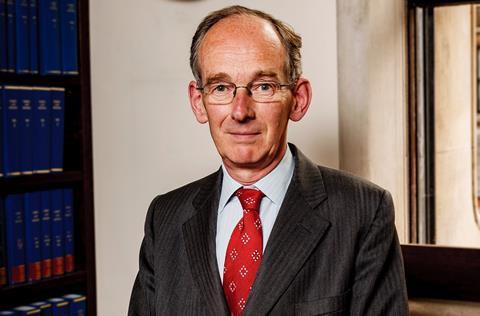The president of the Family Division has ordered an intervening party to pay £20,000 costs for conducting itself in a ‘wholly exceptional manner’.
The Association of Clinical Psychologists intervened in an appeal in The Mother v The Father to question the qualifications of the expert at the centre of the case. But Sir Andrew McFarlane was critical of the ACP’s approach and said it was ‘fair and proportionate’ for the representative body to be responsible for some of the respondent and expert’s costs.
McFarlane, in a ruling from August that was published this week, accepted the argument that there was a risk that a costs order could have a ‘chilling effect’ on potential intervenors in other cases. He also accepted there had been no suggestion of the ACP being at risk of costs during the appeal itself.
But the court heard that the ACP had been unable to substantiate the claim that the expert was unqualified. Once this became clear, McFarlane said, the intervenor could have acknowledged this and stepped back.
Instead it mounted a ‘direct and detailed critique’ of the expert during the second day of the appeal hearing.

The judge said: ‘Where a non-party has been given permission to intervene and becomes an intervenor by reason of its special interests and/or knowledge, it has a responsibility to assist the court in respect of the issues before it.
‘Where an intervenor is found to have acted beyond the remit of the permitted intervention, or acted in contradiction to the court’s direction and/or is found to have acted unreasonably and, in doing so, not to have assisted the court, it is likely to be at risk of an adverse costs order.’
The court heard that Mr Justice Peel had granted permission to the mother to reopen a fact-finding determination made in private law children proceedings. He did so solely on the need for the court to look at the practice of instructing unregulated experts. The ACP was given permission to intervene in the appeal proceedings.
The ACP argued that any subsequent costs order would have a ‘chilling effect’ on other organisations coming forward in future cases. The father’s lawyer submitted that ‘well intentioned intervenors had nothing to fear’ but that in this case the ACP had ignored the court’s direction to play a limited role in proceedings.
In effect, it was further submitted, the ACP had taken over the role of prosecutor and gone beyond an argument over matters of principle. The father had not expected the ACP to conduct itself in this way and he should not have to pay his costs for responding.
The ACP said it might have changed its approach if it had known earlier that costs would be sought. There had been no suggestion, from any party, of an application for costs against the ACP prior to judgment being given on the appeal.
McFarlane said the costs order should take account of this lack of warning and the limited financial resources of the ACP. He directed that the organisation should pay £10,000 each to the father and the expert.
This article is now closed for comment.



























7 Readers' comments